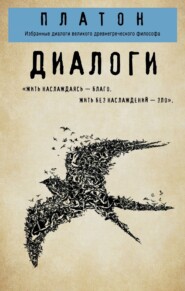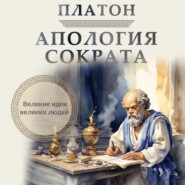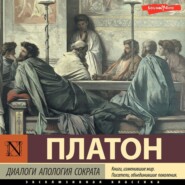По всем вопросам обращайтесь на: info@litportal.ru
(©) 2003-2024.
✖
Euthydemus
Настройки чтения
Размер шрифта
Высота строк
Поля
And is that fair?
Yes, quite fair, he said.
Upon what principle? I said. I can only suppose that you are a very wise man who comes to us in the character of a great logician, and who knows when to answer and when not to answer – and now you will not open your mouth at all, because you know that you ought not.
You prate, he said, instead of answering. But if, my good sir, you admit that I am wise, answer as I tell you.
I suppose that I must obey, for you are master. Put the question.
Are the things which have sense alive or lifeless?
They are alive.
And do you know of any word which is alive?
I cannot say that I do.
Then why did you ask me what sense my words had?
Why, because I was stupid and made a mistake. And yet, perhaps, I was right after all in saying that words have a sense; – what do you say, wise man? If I was not in error, even you will not refute me, and all your wisdom will be non-plussed; but if I did fall into error, then again you are wrong in saying that there is no error, – and this remark was made by you not quite a year ago. I am inclined to think, however, Dionysodorus and Euthydemus, that this argument lies where it was and is not very likely to advance: even your skill in the subtleties of logic, which is really amazing, has not found out the way of throwing another and not falling yourself, now any more than of old.
Ctesippus said: Men of Chios, Thurii, or however and whatever you call yourselves, I wonder at you, for you seem to have no objection to talking nonsense.
Fearing that there would be high words, I again endeavoured to soothe Ctesippus, and said to him: To you, Ctesippus, I must repeat what I said before to Cleinias – that you do not understand the ways of these philosophers from abroad. They are not serious, but, like the Egyptian wizard, Proteus, they take different forms and deceive us by their enchantments: and let us, like Menelaus, refuse to let them go until they show themselves to us in earnest. When they begin to be in earnest their full beauty will appear: let us then beg and entreat and beseech them to shine forth. And I think that I had better once more exhibit the form in which I pray to behold them; it might be a guide to them. I will go on therefore where I left off, as well as I can, in the hope that I may touch their hearts and move them to pity, and that when they see me deeply serious and interested, they also may be serious. You, Cleinias, I said, shall remind me at what point we left off. Did we not agree that philosophy should be studied? and was not that our conclusion?
Yes, he replied.
And philosophy is the acquisition of knowledge?
Yes, he said.
And what knowledge ought we to acquire? May we not answer with absolute truth – A knowledge which will do us good?
Certainly, he said.
And should we be any the better if we went about having a knowledge of the places where most gold was hidden in the earth?
Perhaps we should, he said.
But have we not already proved, I said, that we should be none the better off, even if without trouble and digging all the gold which there is in the earth were ours? And if we knew how to convert stones into gold, the knowledge would be of no value to us, unless we also knew how to use the gold? Do you not remember? I said.
I quite remember, he said.
Nor would any other knowledge, whether of money-making, or of medicine, or of any other art which knows only how to make a thing, and not to use it when made, be of any good to us. Am I not right?
He agreed.
And if there were a knowledge which was able to make men immortal, without giving them the knowledge of the way to use the immortality, neither would there be any use in that, if we may argue from the analogy of the previous instances?
To all this he agreed.
Then, my dear boy, I said, the knowledge which we want is one that uses as well as makes?
True, he said.
And our desire is not to be skilful lyre-makers, or artists of that sort – far otherwise; for with them the art which makes is one, and the art which uses is another. Although they have to do with the same, they are divided: for the art which makes and the art which plays on the lyre differ widely from one another. Am I not right?
He agreed.
And clearly we do not want the art of the flute-maker; this is only another of the same sort?
He assented.
But suppose, I said, that we were to learn the art of making speeches – would that be the art which would make us happy?
I should say, no, rejoined Cleinias.
And why should you say so? I asked.
I see, he replied, that there are some composers of speeches who do not know how to use the speeches which they make, just as the makers of lyres do not know how to use the lyres; and also some who are of themselves unable to compose speeches, but are able to use the speeches which the others make for them; and this proves that the art of making speeches is not the same as the art of using them.
Yes, I said; and I take your words to be a sufficient proof that the art of making speeches is not one which will make a man happy. And yet I did think that the art which we have so long been seeking might be discovered in that direction; for the composers of speeches, whenever I meet them, always appear to me to be very extraordinary men, Cleinias, and their art is lofty and divine, and no wonder. For their art is a part of the great art of enchantment, and hardly, if at all, inferior to it: and whereas the art of the enchanter is a mode of charming snakes and spiders and scorpions, and other monsters and pests, this art of their's acts upon dicasts and ecclesiasts and bodies of men, for the charming and pacifying of them. Do you agree with me?
Yes, he said, I think that you are quite right.
Whither then shall we go, I said, and to what art shall we have recourse?
I do not see my way, he said.
But I think that I do, I replied.
And what is your notion? asked Cleinias.
I think that the art of the general is above all others the one of which the possession is most likely to make a man happy.
I do not think so, he said.
Why not? I said.
The art of the general is surely an art of hunting mankind.
What of that? I said.
Why, he said, no art of hunting extends beyond hunting and capturing; and when the prey is taken the huntsman or fisherman cannot use it; but they hand it over to the cook, and the geometricians and astronomers and calculators (who all belong to the hunting class, for they do not make their diagrams, but only find out that which was previously contained in them) – they, I say, not being able to use but only to catch their prey, hand over their inventions to the dialectician to be applied by him, if they have any sense in them.
Good, I said, fairest and wisest Cleinias. And is this true?
Certainly, he said; just as a general when he takes a city or a camp hands over his new acquisition to the statesman, for he does not know how to use them himself; or as the quail-taker transfers the quails to the keeper of them. If we are looking for the art which is to make us blessed, and which is able to use that which it makes or takes, the art of the general is not the one, and some other must be found.

















